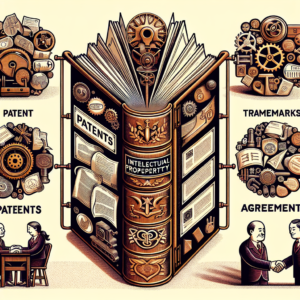Unmasking the Consequences: Shocking Penalties for Copyright Violations
[caption id="attachment_35120" align="alignnone" width="600"] Intellectual Property[/caption]
In an increasingly digital world, the importance of copyright law cannot be overstated. As creators and consumers alike navigate the complexities of intellectual property, understanding the consequences of copyright violations becomes paramount. This article delves into the intricacies of copyright law, the legal framework surrounding it, common types of infringement, the financial repercussions of violations, notable case studies, and preventative measures to safeguard against infringement.
Understanding Copyright Law: An Overview of Rights and Responsibilities
Copyright law is designed to protect the original works of authors, artists, and creators, granting them exclusive rights to their creations. These rights include the ability to reproduce, distribute, perform, and display their work publicly. Copyright does not cover ideas, methods, or systems but rather the expression of those ideas in a tangible form. Creators are responsible for understanding their rights and the limitations imposed by copyright law, including the fair use doctrine, which allows limited use of copyrighted material without permission under specific circumstances. As digital content proliferates, the responsibility to respect copyright extends to all users, emphasizing the need for awareness and compliance.
The Legal Framework: Key Statutes Governing Copyright Violations
The primary statute governing copyright in the United States is the Copyright Act of 1976, which has undergone several amendments to adapt to technological advancements. This act provides the foundation for copyright protection, outlining the rights of copyright holders and the penalties for infringement. Additionally, the Digital Millennium Copyright Act (DMCA) of 1998 addresses the challenges posed by the internet, establishing provisions for online copyright infringement and the responsibilities of internet service providers. Internationally, treaties such as the Berne Convention and the Agreement on Trade-Related Aspects of Intellectual Property Rights (TRIPS) set standards for copyright protection, ensuring that creators' rights are upheld across borders.
Common Types of Copyright Infringement: What You Need to Know
Copyright infringement can take many forms, ranging from unauthorized reproduction of a work to public performance without permission. Common types include the unauthorized copying of books, music, films, and software, as well as the distribution of pirated content online. Additionally, derivative works created without permission, such as adaptations or remixes, can also constitute infringement. In the digital age, the ease of sharing and distributing content has led to an increase in copyright violations, making it essential for individuals and businesses to understand what constitutes infringement and the potential consequences of their actions.
The Financial Impact: Penalties and Damages for Copyright Violations
The financial repercussions of copyright violations can be severe, with penalties ranging from statutory damages to actual damages incurred by the copyright holder. Statutory damages can range from $750 to $30,000 per work infringed, and in cases of willful infringement, damages can soar to $150,000 per work. Additionally, infringers may be liable for the copyright holder's attorney fees and court costs, further escalating the financial burden. The potential for significant monetary penalties serves as a deterrent against copyright infringement, highlighting the importance of compliance with copyright law.
Case Studies: Notable Copyright Violation Cases and Their Consequences
Several high-profile copyright violation cases have underscored the serious consequences of infringement. One notable case is the 2013 lawsuit against the popular music artist Robin Thicke and Pharrell Williams for their hit song "Blurred Lines," which was found to have infringed on Marvin Gaye's "Got to Give It Up." The jury awarded Gaye's estate $7.4 million in damages, a decision that sent shockwaves through the music industry. Another significant case involved the online streaming platform Grooveshark, which was sued by major record labels for unauthorized distribution of music. The platform ultimately shut down and faced substantial financial penalties, illustrating the risks associated with copyright infringement in the digital realm.
Preventative Measures: How to Protect Yourself from Copyright Infringement
To avoid the pitfalls of copyright infringement, individuals and businesses should take proactive measures to protect their intellectual property and respect the rights of others. This includes obtaining proper licenses for any copyrighted material used, whether for commercial or personal purposes. Educating oneself about copyright law and the concept of fair use is crucial, as is keeping detailed records of permissions and licenses. Additionally, utilizing copyright registration can provide legal advantages in the event of a dispute. By fostering a culture of respect for intellectual property, creators and consumers can contribute to a more equitable and sustainable creative landscape.
In conclusion, the consequences of copyright violations can be profound, affecting not only the infringer but also the creators whose rights are compromised. Understanding copyright law, the legal framework governing it, and the potential financial repercussions is essential for anyone engaged in the creation or use of intellectual property. By taking preventative measures and respecting the rights of others, individuals and businesses can navigate the complexities of copyright law while fostering a culture of creativity and innovation.
